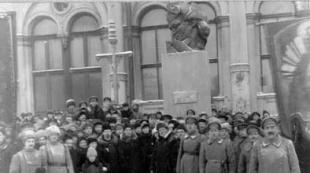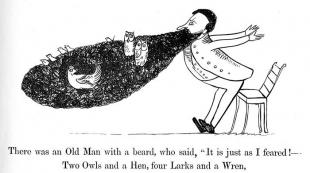Is it possible to say thank you at a wake? Funeral speech at a funeral. Orthodox Christian tradition of remembrance
Funeral speech at a funeral text - farewell words spoken in memory of the deceased by his family and friends. They are pronounced over the grave of the buried with all their hearts. The speaker talks about important and significant events associated with this person, his achievements, and also speaks on the good side about the character and personality of the deceased. It is advisable if he says this orally, and not reads it from a piece of paper.
Funeral speech
Quite a lot of people attend funerals and wakes. Mostly these are relatives and friends of the deceased, but there are others - colleagues, acquaintances, school friends and others. As a rule, the head of the family or the oldest and closest person is the first to pronounce the funeral words. If he is in a strong emotional state, then others present can speak at the wake.
Funeral speech example:
“My grandmother was a wonderful person with a difficult but interesting life. She, along with her three younger brothers and sister, were raised by her mother alone during the difficult post-war years. To say that they lived poorly then would be an understatement. She had to endure many difficulties and hardships, but she never lost her optimism and presence of mind, constantly helping her mother and taking care of the younger members of the family. And later, having married her military grandfather, she steadfastly endured all the hardships of service. In any circumstances, she always maintained exemplary order at home and taught all family members to do so. Grandma was sometimes strict, but fair. I am glad that I managed to learn from her neatness and order, the ability to organize my life. And her famous apple pies were simply incomparable, no one else could do them! I will always remember you, my dear, beloved grandmother! Your warmth, love and care will remain with us forever.”
If others don’t know you well, then at the beginning of your speech you should introduce yourself and explain under what circumstances you met the deceased. The funeral speech should contain words of gratitude towards the deceased and reflect his positive qualities. You can mention any significant moment that occurred with the participation of the deceased.
Funeral words for 40 days:
“I’ll introduce myself for those who don’t know me: my name is (name). We have worked together with (name of deceased) for the past few years and I would like to say a few words in memory of him. He was a true professional in his field, a Specialist with a capital S. Many of our colleagues, young and not only, learned the basics of their craft from him and often used his advice and help. He was very patient and responsive, he could always listen to everyone who turned to him for support, advise something, help out, and never refused anyone’s requests. He could perfectly lift the spirits of anyone who was upset, confused or depressed about something. The countless funny stories, toasts, jokes and anecdotes he told could amuse anyone. We will all greatly miss him at our dinner gatherings and corporate events, where he invariably shone at the table, lifting our morale. There is no other person like him in our team. And maybe it won’t be in my memory anymore. We will all miss him greatly. Until the end of his life, he will remain in my memory and the memory of all our colleagues as an example of perseverance, sparkling cheerfulness, activity and professionalism! Rest in peace, dear colleague!”


It is advisable if you prepare the words for the wake in advance and memorize them. Because a well-formulated text will sound good and be perceived by others. And sluggish, boring speech with hesitations can be regarded as disrespect for the deceased and his family. If you are afraid that you will forget the words, you can take with you a piece of paper with a sample of the funeral speech. You need to pronounce words clearly and slowly. You need to speak confidently and so that others can hear you, but not too loudly.
Speech at a wake examples
Funeral words on the anniversary of death (from a colleague):
"Friends! The deceased worked honestly at the (name) enterprise for more than twenty years. We all knew him as a decent, honest and modest person. They were valued for their skillful hands and reliable character. We will miss his many invisible but irreplaceable contributions to the work! The bright memory of him will remain in our hearts!”
Speech at the wake 1 year (from friends):
“Friends, the best of us has gone to another world. We are all deeply saddened. Our souls are bleeding from untimely loss. The deceased was a support to all of us. He was the first to help and did not wait for requests or complaints. His kind heart and wide soul were always open. He was a clear light and guide in a difficult and dangerous world for all of us, his friends! May the soul of this magnificent man rest in peace! We will always remember him with a feeling of light sadness mixed with secret melancholy!”
Memorial speech for 40 days (from relatives):
“All his life, our father was a worthy example not only to his children, but also to those around him. In everyday life, he demonstrated a wise understanding of true values, kindness and devotion. Any person left him with an enlightened soul. And to us, his children, our father instilled a love for people, a high sense of responsibility and devotion to the Motherland. We consider his departure unfairly early. Eternal, blessed memory to him!”
“Our grandfather was a very kind and good person. His path was long and difficult. He perceived all the difficulties that befell the country as his own. He worked and raised children without complaining about the lack of benefits, lack of food or amenities. He raised children and was a support for his grandchildren. This magnificent man will be greatly missed by all of us. May his memory be blessed!”
Words of condolences are expressed not only during funerals, but also on days of remembrance of the deceased. They say a speech at funerals 40 days later, a year from the date of death, as well as during Parents' Saturdays and other Orthodox holidays. Speeches can be made both at the cemetery and during funeral dinners.


What do they say at funerals? At this event, all deceased relatives and friends are remembered. They remember what they were like during life, what they were interested in, what they loved. Words of condolences are spoken and the blessed memory of the deceased is honored. It is forbidden to say anything bad about the deceased or to recall old grievances. It’s either good or nothing, says the popular saying.
Our products and services
Funeral poems
In addition to the funeral speech, condolences can be expressed in poetry or toasts. These options are more suitable for a wake than for the funeral itself. For example, memorial poems are read on the anniversary of death. They can be written with your own hand or taken ready-made. If you do not have the opportunity to personally attend the wake, you can express your condolences by posting memorial poems in the newspaper.
***
Two tears fell into the flowers,
Two big, pink roses!
From my tormented soul
Hopeless tears rolled out!
They see my wet eyes
Something they don't believe in at all
What you can never change
What is measured with pain and tears!
My heart beats stubbornly
And desperately doesn't want to know
That you can no longer see your beloved eyes,
And you can no longer hug your dear ones!!!
***
You have always been an example to us,
As a person with a pure soul.
And the memory of you is alive
In the hearts and souls of your loved ones.
***
People close to us are leaving.
Do not realize that - forever,
Do not exhaust all the pain of separation,
And he hits backhand - never.
We won't see them, we won't hear them,
We won't ask, we won't talk,
Although, as before, we breathe them,
We love them, we wait for them, we adore them.
Ridiculous, strange, impossible,
That dawn has come again,
Call, scream or cry heart-rendingly,
And there are no more loved ones nearby.
***
We cannot understand or comprehend
Can't survive, can't overcome,
That the chariot of life circles,
As it was before, exactly the same.
The sun is shining and the air is so fresh,
What days it is, but it’s very sad.
Gone is the beautiful hope from hopes
And again my heart is sad and empty.
There has been silence in the apartment for six months now,
Everything there is yours and it’s hard to believe in it.
I would drink the cup of grief to the dregs,
But it still cannot be measured.
I really want to come to you again,
Kiss and just be with you.
With hope to resist in the fight,
Argue with illness and disease.
The further you go, the more immeasurable the depth
The abyss that has come between us
Like you now, like in childhood, I need you,
But it is impossible to beg with tears.
I'm strong, you know I can do it
After all, you and I have been through so much.
I am forever in your debt,
You are an eternal piece in my world.
I'll bring you flowers and stand
And the heart will touch with its wound.
And you will feel how much I love you
My beloved, only mother.
***
Memorial verses for 1 year:
You died too early
Words cannot express our pain.
Sleep, dear, you are our pain and wound,
The memory of you is always alive.
***
We come here
To put flowers,
It’s very difficult, dear,
We can live without you.
***
The Great Tribulation cannot be measured,
Tears won't help my grief.
You are not with us, but forever
You will not die in our hearts.
***
Where do all the dreams go?
And why don't they return?
How we experience pain
After all, they were happy once.
Like waking up every day
Understand that this is all reality,
How painful it is to remember that day
When everything in life changed.
***
My soul is worried without you,
You don't need girlfriends or friends.
Why is it possible without millions?
Why is it impossible without one?
***
I don't rock you in your crib
I come again to the cold fence
I will fix the fallen wreath
And I will sing to you, dear son...
***
They usually leave without saying goodbye,
Without whispering my last words,
Perhaps without going on a long journey,
On that long road of dreams and dreams.
Just yesterday they smiled sweetly at us,
Their eyes emitted a bright light,
And as always, waiting for us to visit,
We dreamed of giving our friendly advice.
They, like all of us, really wanted to live,
And every moment brought them joy,
We didn’t have time to do everything we wanted to do,
They still had so much strength.
At some point, everything broke off,
Someone from above told them their deadline,
The soul rushed about in confusion,
That she didn’t even have time to tell us a few words.
Even if they are not with us, we love them,
And we remember joyful days,
And our heart will never forget them,
It’s as if they are somewhere nearby.
***
We are sad and sad
And there are no other feelings.
Let's remember all the parents,
Let's remember all our relatives!
Let's remember all those who have passed away,
In the prime of his life,
Brothers and sisters of the dead,
Friends and strangers!
They once lived
And they made us happy
Laughed and loved
They took care of us.
A long time ago or recently
They are no longer with us
And reverently to the grave
We bring a bouquet!
In fast-flowing time
We don’t remember other things,
But you are family to us
More than alive!
We ask You, Lord,
About mercy alone,
Forgive their sins, Lord,
May their souls rest!
***
Among those who love there is agreement
Among the lonely there is only pain
Among those deceived by love - revenge
And among the dead - memory and separation
***
Death took you away on a path of no return
And brought me beyond the boundaries of existence.
Here I dissolved in the quiet echo of the alarm
A life lived “in Russian” is yours.
And all that was in the heart before was pain and rage,
Dreams, hopes, faith and love -
In the space of space it suddenly invisibly disintegrated,
But maybe it will be reborn in someone again.
And there are white-trunked birches near the grave,
When the moon is silent in the night,
Tears and dew fall before the clear dawns of the earth,
That the mother's eyes did not drain to the bottom.
***
Your watch has stopped. how you didn’t want to leave!!!
But the heart has stopped beating, and we can’t bring you back,
You've been through a lot in your life,
War and famine, but you survived in spite of everyone.
Your clock ticks in your friends' houses, everyone loved you! you've always been lucky!
Giving life to your family’s watches, you poured your breath into them.
You lubricated their hearts and eased the hours of suffering.
But you couldn’t help yourself, and it’s useless to lubricate your heart.
I didn’t win this fight, I gave it all, I gave it all for free.
We gave you the warmth of our hearts, and we were always with you,
Our dear grandfather, father-in-law, father and father-in-law,
You were so afraid to be alone, you were so afraid to be with yourself.
But the black hag came to you, swinging her scythe and hitting you straight in the heart.
The clock has stopped, but the soul
Stayed with us, we are always with you, we are together.
February, frost, trees without leaves, and we haven’t learned to live without you.
You wanted to be with us so much, but alas
Your watch has stopped...
Funeral toasts
Funeral toasts at a wake are usually said at the table. They do not necessarily specify the identity of the deceased. You can express general condolences to all the deceased:
The grandfather sat in heaven and wept bitterly. A boy came up to him and asked why he was grieving. The old man answered him:
- There is a custom on earth - to drink for the repose of our souls. And then we are always full and with a full jug of wine. We are glad that the children remember us. And now I have an empty jug and that’s why I’m sad.
So let's drink to those who are not with us!
Friends, today is a day of sorrow. There was a time when we had fun and rejoiced with someone who left us. But today you and I drink this cup of sorrow ourselves, seeing off a person close to us on their last journey. Not everyone in the world was honored with the Dormition, like the Mother of God and other holy people. But we will keep in our hearts the good memory of our friend, having hope for resurrection and a new meeting in a new place. Let's drink to the dregs the wine of sadness!
In a wolf pack, the leader suddenly died without leaving a will. The wolves announced a meeting to elect a new leader. For three days they argued and squabbled, because each was afraid that the new leader would begin to take revenge on those who voted against him. When they were already hoarse from screaming, the old wise wolf stood up and said:
- Let's choose someone from outside our pack to be an impartial leader.
Everyone agreed and asked who. Then the wise old wolf suggested choosing a goat as leader. The wolves began to be indignant:
- We just didn’t have enough goats yet!
But the wise old wolf explained:
- Even though he is a goat, he has one advantage: if he starts causing chaos, he can always be bullied.
The wolves agreed with a laugh and called the goat. When they brought the goat trembling with fear, they said to him:
- Listen carefully! We will choose you as our leader if you don’t act like a jerk.
The goat became even more frightened and replied:
- I'm a goat. But I renounce my asshole past. I swear I will never be an asshole again.
The wolves made an approving noise and dedicated the goat to their leader.
“Now you are our leader,” said the old wise wolf. - You can order us whatever you want, and we will obey. Our fate is in your hands.
All the wolves, with their tails between their legs, nodded affirmatively and asked the goat to make a speech. The goat quickly jumped onto the rock, spread his legs wider, fluffed out his beard, stuck out his horns, looked around the silent flock with a slow gaze and bleated sternly:
- Well, which one of us is the goat?
So let's remember our glorious leaders!
Toasts at a wake can also be expressed in poetic form:
Blessed memory of those who have left us,
Let's drink to this now.
Let it be like granite in our hearts,
Preserves the memory of loved ones who have passed away.
Let all the good things that happened to them
A damp grave will not bury you.
No matter how long we keep the memory,
He will live with us for that long.
Funeral notes
You can also honor the memory of the deceased with the help of memorial notes. In churches there is a special table where there is a sample memorial note on which you can write it. A cross is placed at the very top of the sheet and marked “for repose.” Then the full names of the deceased are written in the genitive case and in church spelling (for example, Ivan - John), neatly and legibly. Usually about ten to fifteen names are written. Moreover, everyone who is written there must be baptized in the Orthodox Church.


In addition to the names, the note indicates which deceased person is: newly deceased - deceased for forty days after death or ever-memorable (worthy of constant remembrance) - deceased who has a memorable date on this day.
When going to a funeral or wake, it is important to remember etiquette. You need to behave delicately and tactfully. It is worth preparing words of condolences, which can be expressed through a funeral speech, memorial poems or toasts. An appropriate and competent speech will be appreciated with gratitude by the family and friends of the deceased.
It should be understood that at a funeral a funeral speech is made, which is addressed to the entire circle of guests. A funeral is a rather difficult event and relatives choose a person with good diction and who knew the deceased well.
If you are reading a memorial speech, then you should not rely on improvisation; there is nothing wrong if you record the speech. Optimal speaking time up to 5 minutes. You should not retell the entire biography of the deceased. The speaker must select the brightest, most important, good moments that highlight all the best qualities of the deceased.
Since you personally knew the deceased, you can remember a kind deed, good words, or moments, and also emphasize how significant this person was to you. At the end of the speech they usually talk about what the deceased taught us, what benefits he did, that he did not live his life in vain.
In a funeral speech, you cannot recall the shortcomings and bad deeds of the deceased; remember that good things can be said about a bad person. For example, if a person was greedy, then we can say that although he did not always know how to share joy with others, he is an example for us of how to be happy ourselves and achieve everything with our own work! In this way, guests will learn about the deceased, his busy life, and good deeds.
Warm words warm the souls of guests and relatives, thus making the loss easier to bear.
An example of composing a speech:
1. Appeal:
Dear guests [Name]!
-Dear relatives and friends!
-Dear family and friends of our beloved [Name]
2. Who you are:
I am the husband of our revered [Name].
-I am the sister of [Name] whom we remember today.
-[Name] and I have worked/served together for a long time/in recent years.
3. About how it all happened:
My mother was ill for a long time; we understood what would happen, but when we got a call from the hospital...
-When I found out that [Name] died, that evening I couldn’t think about anything else.
-Although my grandfather lived a long life, the news of his death shocked me.
-Today is 9 days since my mother left us.
-A year ago we said goodbye to [Name], a respected and worthy person.
4. A few words about the best qualities of the deceased:
Grandmother was the kindest person, often receiving guests in her cozy house in the village.
-She was very generous, and her smile gave everyone a good mood.
-He was known as an optimist and a person with whom it was easy to go through life.
“He was a support for all of us; you could always rely on him in difficult times.
Remember that the eulogy at a funeral must come from your heart, just take a pen and write about what is in your soul, describe the deceased. It’s better if your speech is not formally correct, but sincere, which will touch the hearts of the guests.
Example of a funeral speech There are few facts from life here, but the speech was spoken from the heart:
Dear relatives and friends! I am the husband of our revered [Name]. Having learned about the tragedy, I could not believe what had happened for a long time, I could not think about anything all evening and it still seems to me that this was just a dream.
Not many people know how pure and bright a person [Name] was. Already at the age of 18, she made her first journey, and this passion for seeing new things remained forever in her heart. We met on one of these trips; it was an unforgettable month in an unforgettable city.
We both considered ourselves free as birds, and did not want to tie the knot, but this acquaintance turned everything upside down. She was an incredibly kind and sympathetic person. She always helped strangers, always took into account the opinions of others and avoided conflicts. I’m glad that, although for so little, I was with her and was able to enjoy the purity, tenderness and feelings that [Name] gave me. I will always remember you [Name], your warm smile will forever remain in our hearts!
What do they say at funerals?
At the wake, everyone can show their respect to the deceased. If you want to honor the memory of a loved one, prepare in advance, come up with a nice toast or poem to stand at the memorial table and honor the memory of your loved one.Before sitting down to the table, the deceased is honored with a minute of silence. Orthodox Christians begin the commemoration by reading Psalm 90 and the Lord's Prayer. The owner of the house invites guests to the table and people sit down without sitting in the empty place allocated to the deceased.
First word given to the owner of the house: -Today we saw off our loved one on his last journey (calls him as was customary in the family). May he/she rest in peace and may his/her memory be eternal. (Bows to the portrait or empty space of the deceased).
Everyone drinks (according to tradition, jelly). Without clinking glasses. Then the word is given to the presenter. The presenter also makes his speech, concluding it with the words: - May the earth (says the name and patronymic of the deceased) rest in peace, and may the memory be eternal!
Then the leader gives mourning words to everyone from the elders to the minority: As a rule, these are toasts, at the end of which they say May [Name] rest in peace, and may the memory be eternal!
In memorial words, the use of aphorisms, favorite expressions of the deceased, and stories from life is allowed. Any negative words, conversations about bad character traits, or showdowns are not allowed.
Example: Friends, today is a day of sorrow. There was a time when we had fun and rejoiced with someone who left us. But today you and I drink this cup of sorrow ourselves, seeing off a person close to us on their last journey. Not everyone in the world was honored with the Dormition, like the Mother of God and other holy people. But we will keep in our hearts the good memory of our friend, having hope for resurrection and a new meeting in a new place. Let's drink to the dregs the wine of sadness!
Example: We are sad and sad and there are no other feelings. Let's remember all the parents, Let's remember all the relatives! Let us remember all those who have passed away, In the prime of their lives, Brothers, sisters of the dead, Acquaintances and strangers! They once lived and made us happy, laughed and loved, took care of us. For a long time or recently They are no longer with us, And we reverently bring a bouquet to the grave!
Or just incidents from life, someone will remember how well he drew, someone will remember how wonderful they worked together, and someone will talk about his good deed.
Example: “Our grandfather was a very kind and good person. His path was long and difficult. He perceived all the difficulties that befell the country as his own. He worked and raised children without complaining about the lack of benefits, lack of food or amenities. He raised children and was a support for his grandchildren. This magnificent man will be greatly missed by all of us. May his memory be blessed!”
The funeral words must be said while standing. After your funeral words, the head of the family must end your words with the phrase - May the earth (says the name and patronymic of the deceased) rest in peace, and may the memory be eternal! Or for the believers the Kingdom of heaven and eternal peace for him/her.
When everyone has spoken, the head of the house thanks everyone for their kind words and once again wishes everyone to be strong in order to survive the bitterness of loss and remain firm at all times. Everyone gets up, drinks, bows and sits down again. According to tradition, the last toast is made by the eldest woman in the family, or the eldest relative. She also thanks everyone for coming and honoring the memory of the deceased and, if necessary, invites everyone to the next commemoration. After the last toast, they do not say goodbye, but bow to the portrait of the deceased (or an empty place at the table) and on the way out they offer words of condolences to the relatives.
How to express condolences over a death?
What should you not say? Often on such difficult days, it is very difficult for us to formulate our thoughts and express our condolences correctly. We begin to speak in general phrases, instead of simply supporting people dear to us in difficult times. Let's consider what it is better not to say when expressing your condolences:2. God judged, everything was God’s will, God took it away. You cannot say such a phrase to a mother who has lost a small innocent child, thereby you seem to be saying that God did this to them. It is better to say that now a person is in a better world.
3. How are you? There is no need to dryly ask relatives how they are doing; if there is a need to maintain a conversation, it is better to ask how you are feeling? What's on your mind? However, if you are not a loved one, then just inquire about the funeral itself and ask if there is anything I can do for you.
4. Everything will be fine, don't cry! You should not try to cheer up the relatives of the deceased with such expressions; after all, this is mourning and these days relatives most often want to think about today, and not about the future.
5. Future-oriented wishes do not belong to words of condolences: “I wish you to come to your senses quickly after such a tragedy”
6. It is considered bad form to find positive aspects in a tragedy and devalue the loss. No problem, give birth again! He was very sick and finally got over it! Remember that people here have gathered to honor the memory of the deceased.
7. You’re not the only one, it can be worse, that’s what happened with…..Such statements are tactless and do not help in any way to alleviate the pain of loss.
8. You can’t look for someone to blame. We hope this driver goes to jail! We hope this killer will be punished. Such statements also do not apply to words of condolences.
9. “You know, he drank a lot and was a drug addict, people like that don’t live long.” Such statements are also tactless, about the deceased it’s either good or nothing.
10. Questions “How and where did this happen?” and others, it is also not appropriate to ask when expressing condolences.
Verbal condolences to the loved ones of the deceased
The most important thing is that your words of condolences are sincere and from the heart. For example, if you did not know the deceased and his relatives well, then a simple handshake or hug with words of condolences for your loss will be enough. The same applies to people who simply have no words or only two words, I sympathize with you. You can simply hug, take your hand, put your hand on your shoulder, thereby showing that you sincerely sympathize and share your grief with the relatives of the deceased.It is considered good form to offer your help, ask if there is something I can do for you? Most often they will politely answer you, no thanks, no need. But if help is really needed, then it can be help in preparing dishes for the funeral, in submitting notes to the church for conducting church liturgies for the deceased, and even financial assistance.
How to find words of condolences for a death?
 To make it easier to express your condolences, think about the deceased, who he was to you, remember good incidents from life, his actions and joint affairs. Also think about the feelings of your loved ones, how hard it is for them, how they feel. This will help you choose words for your condolences.
To make it easier to express your condolences, think about the deceased, who he was to you, remember good incidents from life, his actions and joint affairs. Also think about the feelings of your loved ones, how hard it is for them, how they feel. This will help you choose words for your condolences. If you feel guilty about something before the deceased, your sincere apologies will be good form, because condolences are both forgiveness and reconciliation. There is no need to squeeze words out of yourself, if there are none, then just come up and sincerely say how you condole, everything will be visible in your eyes. Below are examples of words of condolences:
He meant a lot to me and to you, I mourn with you. Let it be a consolation to us that he gave so much love and warmth.
Let's pray for him. There are no words to express your sorrow.
She meant a lot in your life and mine. Never forget…
It is very difficult to lose such a dear person. I share your grief. How can I help you? You can always count on me.
I'm very sorry, please accept my condolences. If I can do something for you, I will be very glad.
I would like to offer my help. I would be happy to help you...
Unfortunately, in this imperfect world we have to experience this. He was a bright man whom we loved. I will not leave you in your grief. You can count on me at any moment.
This tragedy affected everyone who knew her. Of course, it’s harder for you now than anyone else. I want to assure you that I will never leave you. And I will never forget her.
Please, let's walk this path together. Unfortunately, I only now realized how unworthy my bickering and quarrels with this bright and dear person were.
Excuse me! I mourn with you. This is a huge loss. And a terrible tragedy. I pray and will always pray for you and for him.
It is difficult to express in words how much good he did to me. All our differences are dust. And what he did for me, I will carry with me throughout my life. I pray for him and grieve with you. I will be happy to help you at any time.
Death does not happen very often in our lives, so no one is prepared for it. And because of strong feelings, it is very easy to make some kind of tactlessness. Here are simple rules that are easy to remember:
1. WHAT SHOULD I TELL THE RELATIVES OF THE DECEASED?

Keep your speech short, don't make long speeches. “My condolences” is the best and most meaningful phrase in which you will not get confused.
2. WHAT NOT TO SAY?

Avoid vulgar platitudes like “Time heals”, “He feels good now”, etc. Do not ask how exactly the person died, do not complain that he could have been cured if he had turned to other specialists
etc. There is no need to say “I know what it’s like to go through this,” your experience is of no interest to anyone, people are in grief.
3. DO YOU HAVE TO WEAR BLACK?

No, this is not necessary. Dark blue, gray or eggplant colors are also appropriate. T-shirts, shorts and other overly provocative outfits are inappropriate.
4. I HEARD THAT IT IS INappropriate TO BRING FLOWERS TO A JEWISH FUNERAL. IT'S RIGHT?

Yes it is. Different cultures have different traditions, so do your homework and research before attending a funeral. As a last resort, be aware of those around you and do the same things as people of your gender.
5. I WANT TO GIVE SOMETHING TO THE FAMILY. WHAT IS POSSIBLE?

A card, flowers, food for the funeral table or money for funeral expenses, everything will be appropriate. But to avoid getting into trouble, check the appropriateness of your gift with the funeral director, the person from the family of the deceased who organizes everything.
6. IS IT POSSIBLE TO TAKE CHILDREN TO A FUNERAL?

Yes, if they are old enough to endure a long ceremony without fuss. Be prepared to get out quickly with your children if necessary.
7. I WILL SEE MY RELATIVES WHOM I HAVEN’T SEEN FOR A LONG TIME. CAN I HAVE A COUPLE OF PHOTOS?

No, it's not worth it. No photographs at the funeral and especially no publications on social networks. Unless you were invited specifically as a photographer.
8. I WOULD LIKE TO HELP THE FAMILY IN SOME WAY

They will be very busy and anxious. Therefore, instead of the offer “if anything happens, rely on me,” offer your help specifically: - I can take everyone to the airport - I will take care of the table - I can carry the coffin
Etc. Never promise something you can't deliver.
9. NO PHONES

Turn it off during the funeral. Be prepared to be asked to move seats to make room for close relatives. Don't tell funny stories or jokes without thinking twice about whether it's appropriate.
10. AFTER THE FUNERAL

After some time, visit your family, not necessarily in connection with memorial days. Show people with your visit that life goes on and they are valuable to you even after the funeral.
At the hour of remembrance, until the pain of loss subsides, the first thing to remember is this delicacy. Find out, check out examples of words of condolences and. These guides will give you an idea of ethics of remembrance and they will tell you true words of consolation.
But funeral speech has its own specifics. In it you address to a whole circle of guests who gathered to console loved ones, remember the deceased themselves and listen to what friends and relatives would say about him. Your words are awaited, and yours funeral speech may sound with b ABOUT greater pathos than is customary for personal expressions of condolences.
Words of grief directly at the funeral should be extremely brief, but speech at the wake may not be limited to a couple of phrases.
Funeral words of grief and funeral speech
First, introduce yourself and, if it is not obvious to everyone, say who you are related to the deceased. Many people will speak at the wake. That's why funeral speech should be concise, and thoughts are expressed accurately. Guests will understand if the sentence is interrupted by sudden crying. But unpreparedness, verbiage, and even more so drunken babble, will be perceived by those gathered as a sign of disrespect for the deceased. Don't rely on improvisation! Have brief theses with you, and at home or on the way to the funeral ceremony, repeat your funeral speech several times.
Don't retell the biography - enough tell about one bright incident, an episode of life so that guests remember this interesting fact. It is important that the event you describe highlights one of the positive traits of the deceased. It's better to talk about that episode which you yourself highly appreciated. Study examples, their loved ones (each obituary contains an episode from the life and condolences).
Focus the audience's attention on the character trait that your story demonstrates. Every negative trait has a bright side. Examples of complementary synonyms:
- About a grumpy person you can say, “He taught me a lesson in looking at the world critically.”
- About the tight-fisted one: “Caution, rationality and foresight are what we all lack today, and what we can learn from the deceased.”
- Carelessness in finances: “He was so confident of a better future...”
- Suspiciousness: “Knew human nature...”
- Not very smart: “Trusting, naive, he trusted people so much...”
- Arrogant: “He knew his worth, his circle included only the best...”
- Stubborn, stubborn: “Principled...”
- Amenable, without a core: “Conflict-free... His credo is compromise.”
At a wake you cannot talk about shortcomings: “ About the deceased it’s either good or nothing“is the basis of the etiquette of remembrance. You should not remember, especially out loud, about failures, weaknesses, sins and grievances. Forgiveness, reconciliation, remembering better things- this is the desired aura of the memorial ceremony.
Words of Sorrow It is appropriate to supplement with a quote from the thoughts of the deceased: an order, instruction, commandment or moral maxim that he voiced during his lifetime. Then the funeral speech should begin with a mention of the benefits that he brought to loved ones and society. Conclude that the person did not live his life in vain and promise eternal memory in the hearts of the relatives and friends of the deceased.
“May he/she rest in peace! Everlasting memory!" You can end your funeral speech with these words, but many will do this. It is better to choose an appropriate epitaph that is in tune with the personality of the deceased:
- If you or the deceased are believers, look here:, or phrases.
- If, on the contrary, the deceased is consistent.
- For the deceased, as well as an epitaph.
- Many beautiful ideas for words of sorrow in or in epitaphs.
Protocol of commemoration
At a wake you need to stand and honor the deceased. minute of silence. The leader’s mission is entrusted to a person close to the family, who will be able to control his emotions in a mourning environment. He alternately gives the floor relatives according to the degree of proximity - spouse, children or parents, immediate relatives, and then friends of the deceased.
The presenter should prepare several phrases in advance to remove the pause and redirect the attention of the guests if the speaker’s speech is interrupted by tears. Funeral words are usually pronounced standing.
Orthodox Christian tradition of remembrance
If the deceased was a believer, then a funeral should be held according to church customs, in compliance with church rituals. Speeches and prayers are key components of a Christian memorial ceremony. Afterwards, the host of the ceremony should thank all the guests for coming to the funeral and praying for the soul of the newly deceased. Funeral speeches pronounced when everyone has already gathered at the table.
In the Orthodox Christian tradition, the funeral begins with Psalm 90 and. The atmosphere at the table is restrained; you need to talk quietly, in a half-whisper. The first word is given to the head of the family. Then the funeral is led by the head of the ceremony - a person respected by the guests and close to the family. Funeral words at Orthodox funerals pronounced according to seniority. Everyone who wants to speak can and should have the floor.
Funeral toasts* at Orthodox funerals end with the words: May [Name] rest in peace and may the memory be eternal! Everyone drinks without clinking glasses and bowing to the portrait or empty seat of the deceased.
* Alcohol is not included in the Orthodox tradition of commemoration (see). But the practice of remembering “without clinking glasses” is deeply rooted among the people. It is important to observe moderation!
In Orthodoxy it is known that, thanks to prayers, funeral services and other Christian rituals, the tossing soul of the newly deceased becomes easier. A kind, warm word from family and friends pacifies the soul of the deceased and dulls the grief of loved ones. At the end of the commemoration, rising from the table, each bows to the portrait or towards the place of the deceased. Leaving, . It is not customary to say goodbye at a wake.
Poems for funerals? Yes, but delicately and in moderation.
When expressing condolences in person, face to face, it is undesirable to turn to the verse. Read gathered at a common table friends of the deceased are allowed - after all, everyone expects mournful sayings, memories and some pathos. Perhaps in verse. The main thing is that the rhyme is not vulgar, that it reflects the best features of the deceased and corresponds to the moment. And there was brief. Or very brief.
Example of a funeral speech
In order not to be constrained by the “correct” but inappropriate speech, instead of a specific example, we will offer the optimal structure of a funeral word with example phrases.
Appeal:
- Dear friends and relatives of [Name]!
- Dear guests!
- Brothers and sisters!
- Dear family and friends of our beloved [Name]
Personal positioning in relation to the deceased(modestly):
- I am the nephew of our revered [Name].
- I am the brother of [Name] whom we remember today.
- [Name] and I have worked/served together for a long time/recent years.
About the mourning event(news of death or memory of a funeral):
- My father was ill for a long time; we understood what would happen, but when we got a call from the hospital...
- When I found out that [Name] died, I couldn't think about anything else that evening.
- Although my grandfather lived a long life, the news of his death shocked me.
- Today is 40 days since my mother left us.
- A year ago we said goodbye to [Name], a respected and worthy person.
Few words about the best qualities of the deceased:
- Grandmother was the kindest person, a hospitable and hospitable hostess.
- She has been a support and reliable support for her deceased husband for five years now.
- He was known as a joker and an optimist; it was easy and carefree to be with him.
- He gave confidence in the future and was a support for those around him.
Quote a command, advice, or moral value that the deceased encouraged family and friends to follow. Then, in a few sentences, tell about a significant incident or episode of life, which illustrates a positive quality of the deceased. It’s good if this one is yours. How to buy grave monuments inexpensively in Moscow? Photos and prices for tombstones made of granite and marble.
“Making monuments.ru” is a portal about monuments and “ order table" Fill out an application, and granite workshops in your city will see it and make you offers.









